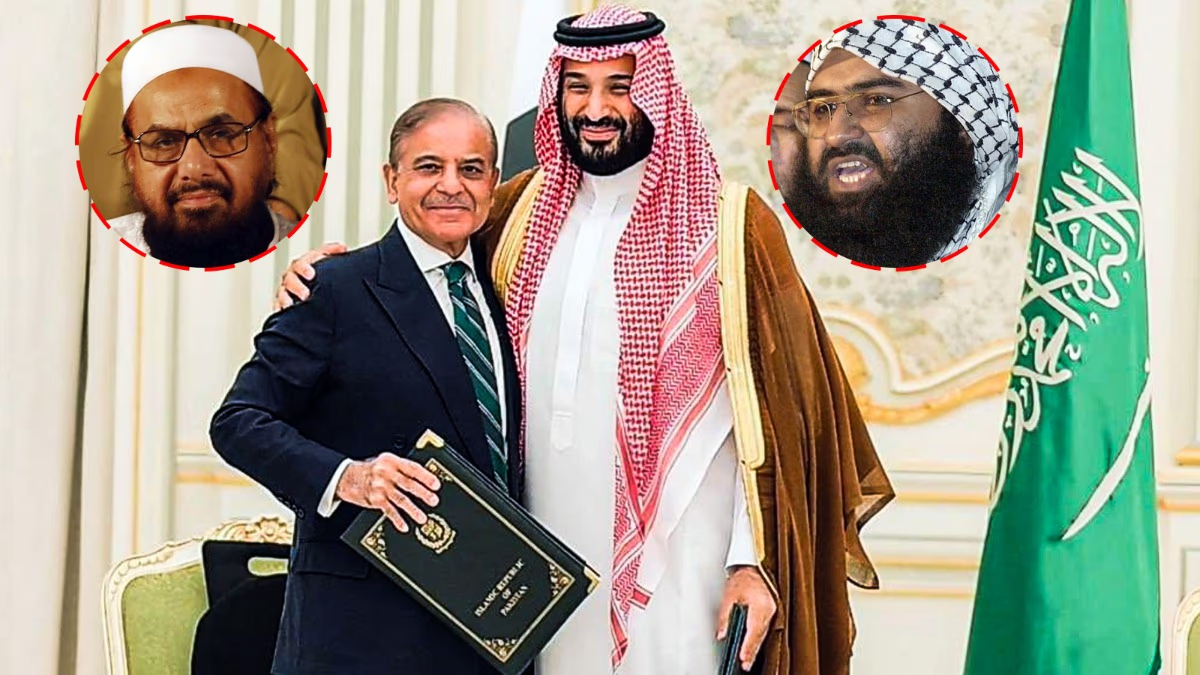In the opulent Yamama Palace of Riyadh, a significant document was signed on September 17, 2025. This agreement between Saudi Arabia and Pakistan boldly declares, "An attack on one is an attack on both." Known as the 'Strategic Mutual Defense Agreement', it serves as a shield for Saudi Arabia and an economic salvation for Pakistan.
According to Al Jazeera, Riyadh perceives this deal as a means to receive Islamabad's 'nuclear umbrella'. At a time when the Gulf state of Qatar has been attacked twice recently, Saudi's confidence in Pakistan's nuclear capabilities is crucial. Meanwhile, Pakistan, on the brink of economic collapse, bearing IMF loans and Chinese debts, finds a reliable ally in Saudi Arabia.
This raises an important question for India. As Saudi Arabia entrusts its security to Pakistan's army, will it also bear responsibility for the terrorists flourishing in Pakistani soil?
Pakistan has long been a sanctuary for terrorist groups. Organizations like Lashkar-e-Taiba and Jaish-e-Mohammed target India from this safe haven. The names of Masood Azhar and Hafiz Saeed are tied to infamous attacks, including the 2001 Parliament attack and the 2008 Mumbai attacks, with ISI's involvement evident in these incidents.
If these militants dare to threaten India again, what would be Saudi Arabia's reaction?
Who Will Vouch for the Terrorists' Actions?
How will Saudi Arabia react when it partners with Pakistan under such circumstances? Would Saudi Arabia take responsibility for the terrorists' deeds from Pakistan? This is a pivotal question upon which this agreement rests.
As publicly disclosed, the central statement in the 'Strategic Mutual Defense Agreement' is: “Any aggression against either country shall be considered aggression against both.”
However, 'aggression' typically refers to state or state-sponsored attacks. Legally, including attacks by non-state actors presents complexities.
The agreement between these nations currently lacks explicit provisions for internal attacks by terrorists falling under its scope.
Pakistan Boasts to Its Domestic Audience
Pakistan's security experts propagate this agreement as a significant victory for Islamabad to its domestic audience. Javed Hassan, former ambassador to Iran, told Geo TV, "This sends a clear signal to countries like India or Israel, deterring them from aggressive moves against Pakistan or Saudi Arabia."
Former Senator Mushahid Hussain mentioned on Geo News that "India is shocked, they are surprised." He believes Pakistan's prowess demonstrated during Operation Sindoor has led Arab nations to recognize Pakistan as a regional security guarantor.
Agreement Won't Deter India from Responding
The conclusion is that there isn't a complete “guarantee for terrorists”, but rather a “guarantee against national-level aggression”. It ensures that Saudi Arabia feels accountable in case of an attack or military action against Pakistan by a foreign state. This guarantee, however, is limited or ambiguous concerning terrorist groups, insurgent entities, or internal security threats.
Michael Kugelman, a sharp observer of South Asia's political and security landscape, says,
'This agreement won't stop India from responding to Pakistan. But it certainly strengthens Pakistan's position.'
He noted on X, "Pakistan hasn't just signed a mutual defense agreement; it has secured a deal with a close ally who is also a significant partner of India. While this won't deter India from counterattacks, with China, Turkey, and now Saudi Arabia backing Pakistan, it places the country in a favorable position.
Professor Muqtedar Khan from the University of Delaware mentioned to BBC, 'If India attacks Pakistan, Saudi might not send troops, but it can provide financial support. Saudi has access to American technology, which it might supply to Pakistan. This is significant for Pakistan's military.'
India never initiates conflict with Pakistan but reacts solely as a response. India's military actions, like the Surgical Strikes, Balakot, and Operation Sindoor, are examples. These responsible actions present New Delhi as a serious nation recognized globally, garnering international support when India acts in self-defense.
New Delhi's defensive operations focus solely on cross-border terrorism and state-sponsored threats, irrespective of their nature. Even in counterresponse, India avoids targeting civilian areas or endorsing reckless attacks. During Operation Sindoor, India asserted its operations targeted terror bases specifically.
Against this backdrop, if terrorists in Pakistan dare act against India, Saudi Arabia cannot support or justify such actions against India's counterterrorism efforts.
Saudi Arabia's Clear Stance on Terrorism
India and Saudi Arabia have signed a comprehensive, multi-faceted agreement on counterterrorism and collaboration. The treaty designates terrorism as a grave threat to humanity, condemning all forms of terrorism and extremism. Both countries agree that no act of terrorism can be justified for any reason.
Saudi Arabia, one of India’s largest trading partners, rejects any attempt to link terrorism to any specific race, religion, or culture, despite Pakistan's persistent attempts. Saudi Arabia even condemned the Pahalgam terror attack.




